Mazdoor Kisan Sangharsh Rally: ‘Amrit Kaal’ Came With Increased Exploitation
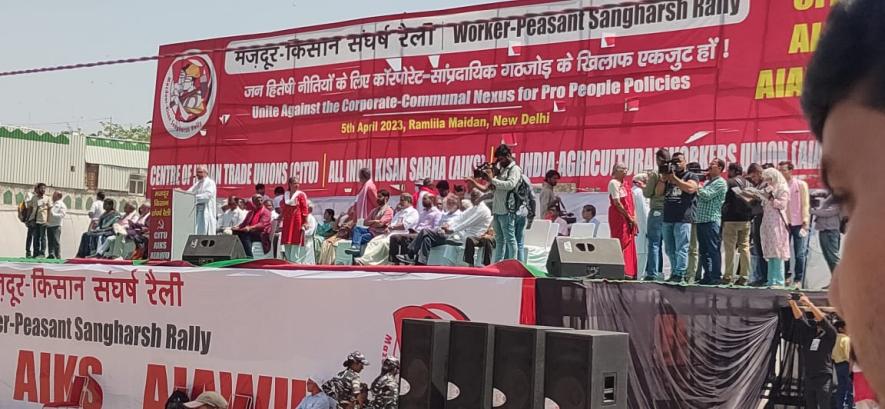
The working class from across the country reached the National Capital to attend a rally at the Ramlila Maidan on Wednesday. The rally was a collective effort of CITU (Centre for Indian Trade Unions), AIKS (All India Kisan Sabha), and AIAWU (All India Agricultural Workers Union).
With the sunrise at the National Capital’s Ramlila Ground, came a wave of the red flags carried by the working class. From agricultural farmers, landless labourers, ASHA and Anganwadi workers to the migrant city labourers and factory workers, all came under one banner called the Majdoor Kisan Sangharsh Rally.
Each state had its slogans in its mother tongue, and each section held the banners of what and who they represented, but thousands of people echoed under one voice, the voice of struggle and the fight against injustice. Though the languages were different, the spirit of the movement was one. Whoever one was to talk to, they were well aware of the exploitation affecting them and did not hesitate in holding the regime responsible.
Noon roti(Salt and chapati), the only meal for a family of 19 in the past 10 months
A 70-year-old man named Ram, who was at the rally, narrated to NewsClick how there was no industrial work or a place where his family members could even go and do a labourer’s job. For a family of 19, only five of them earn. He was illiterate as a kid, but the lack of job opportunities did not just affect him but also passed on to his kids, who are daily wage labourers.
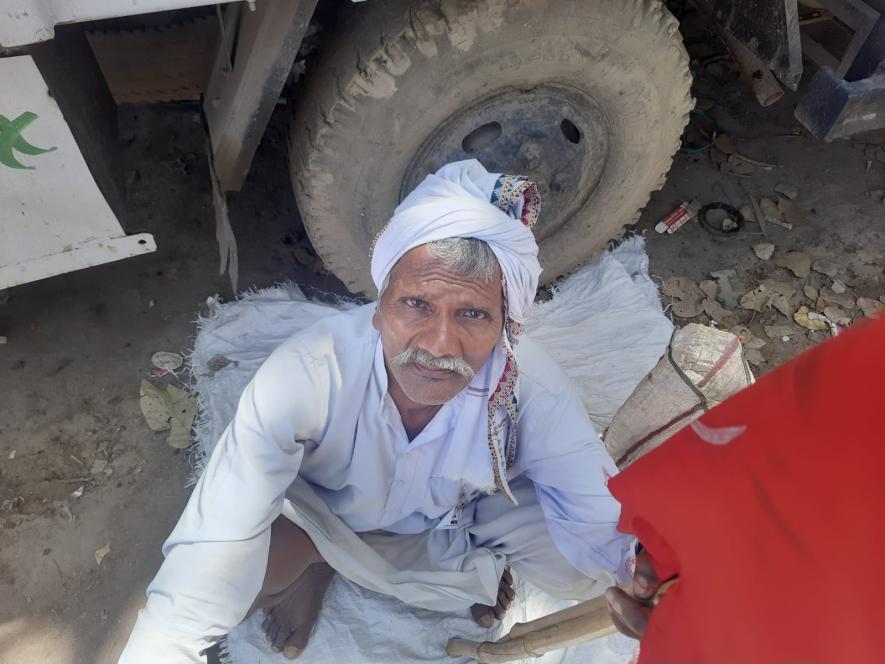
The 70-year-old man with a family of 19, is ready to work even at this age. "Kamayenge nahi to marr jayenge," he says.
“I have no land, never had any. All I ever did was work in people’s fields and earn the money they gave. Whenever there would be NREGA work, we would do better than the usual conditions, but the past 10 months have been the most difficult, With no NREGA work in my village and no means to get to the city, we are surviving on the rations that are given by the government,” he said.
Ram narrated how he has no idea about the ‘Old Age Pension Scheme’ and has never received a single penny. He said that no government authority ever spoke about it either. “All I need is a place to stay for my kids and some work throughout the year. Are we living just to vote?” Ram asked. The landless labourers in his village have been pushed down to an extent where they are looking for nothing more than mere survival, he said. His way to Delhi did not come easy either. He kept seeking help from the village leaders who were going and eventually convinced them to let him tag along.
As Ram spoke of not getting a pension, others around him who were a part of the same delegation from Bihar came in and said that although they received a pension, it was a mere Rs 400 a month. These people had remained daily wage labourers without social security for their whole lives. Ram, even at this age, said that he is willing to work if he gets any. “Kamayenge nahi to marr jayenge (If I do not earn, I wil die),” he said.
‘Drought Will Kill us’: Andhra Farmers
After almost every one hundred metres, there were people dressed in the traditional South Indian mundu and T-shirt. The representation from the South was significant. A large number of working-class people had come all the way from Kerala, Tamil Nadu, Karnataka, and Andhra Pradesh.
No matter what state a person was from, the constant words that one could hear were “We are tired of this inflation”, and “We need employment”, among other issues.
The group from Andhra Pradesh that the reporter met with was of farmers who cultivated paddy, and cotton, among other crops. “Our main problem is that we do not receive MSP. This year, I invested Rs 50,000 in my crops, and in return, got only Rs 20,000. Not just this, if the electricity bill which the govt wants to impose turns out to be true, there will be an extra expense of Rs 4,000-5,000 which we cannot afford at any cost,” narrated M Rangaswamy, a middle-aged man from Kurnool district in Andhra Pradesh.
He has been suffering a loss for the past three years. The financial assistance provided to the farmers there is Rs 6,000 from the central government and Rs 7,000 from the state government. However, the farmers from Kurnool narrate that in the absence of irrigation facilities and groundwater below 400 ft, the money is nothing when compared to the costs incurred. Giving an example, Rangaswamy said, “Last year, the prices we received for cotton was Rs 13,000 per quintal; this year, it has dropped to Rs 5,000. If the Centre does not come to our rescue now, the suicide rates in our state will rise rapidly.”
While the people from rural India were dissatisfied with the behaviour meted out to them and the cropping conditions, let alone the exploitation from authorities, the urban labourers narrated a different side of the exploitation story. Ram Mohan from the Siwan district in Bihar has been working in Delhi for the past few years. He is only 24. He worked at a small company that paid him Rs 7,000 when he joined. “In a city like Delhi, although I have started to wear better clothes and admire the lifestyle, the purpose of migration has not been served,” Mohan said, suggesting he had not been able to support his family with his low salary.
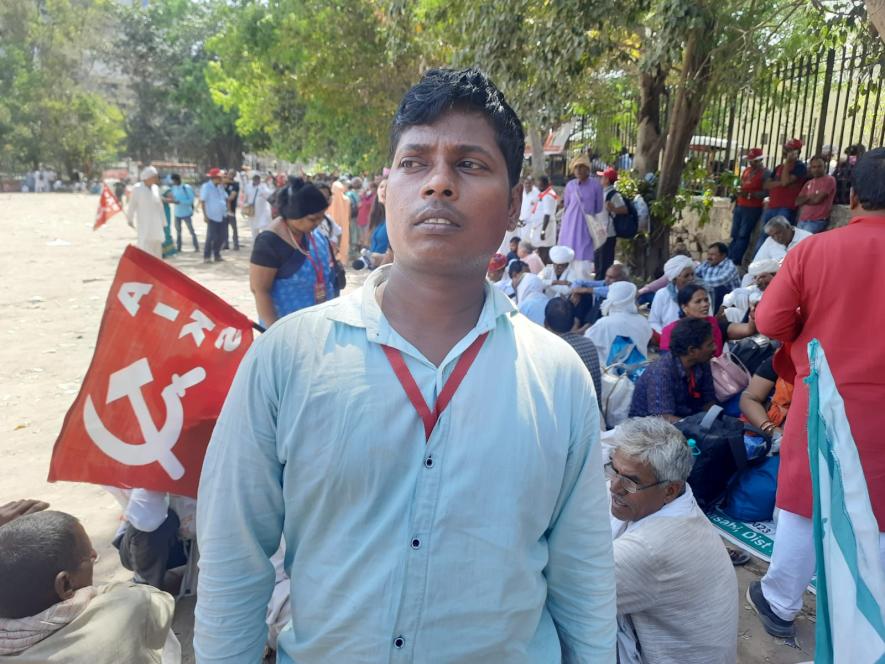
Ram Mohan is a city laborer, who migrated from Bihar to Delhi. The hopes that a metro city would help him provide financial assistance to his family have been crushed.
“When I left the village, I had hopes and aspirations in mind, I wanted to lead a better life, but only after coming here, I realised that maybe life in the village could have been better. Over there, although we do not have a lot of land, we still live happily. Here, the company owner behaves as if he has bought me,” he said.
Workers from Nashik dictate a similar tale. They have been working for a salary of Rs12,000 for the past six years. “We are not allowed to organise or agitate,” they said, adding that permission to be taken if they wish to protest and it has to be 60 days in advance. “By then, the ‘maalik’ ends up creating conflicts amid the workers themselves, and the issue is buried.”
A striking sight at the rally was the presence of women in huge numbers. They had travelled miles without any proper arrangement just to voice their thoughts and express their anger against the oppression they had undergone. People from different states greeted each other as they shared their miseries. “Which State are you all from?” asked a woman from Punjab to an Assamese group. Coincidentally, they were all ASHA workers. Soon, other women from Punjab gathered around, and the group started talking. They clicked pictures, sat together, and discussed their struggles in their respective states.
A few groups were sitting in various corners of the ground. NewsClick found a group of widows from Sultanpur village in Chandauli district who worked as mid-day meal workers and were the sole earners of their families.
However, they said they have to broom the floors, prepare meals for the teachers, and wait all day until the teachers leave to lock the doors. These are not part of the job for which they were hired.
“Are you a govt representative?” asked one of them asked NewsClick as the group hesitated in sharing their story. Asha,39, has fed over 160 kids for the past 15 years. When she joined, she was told that her job was to prepare food for the kids. The amount paid to her back then was Rs 1,000 for a month.
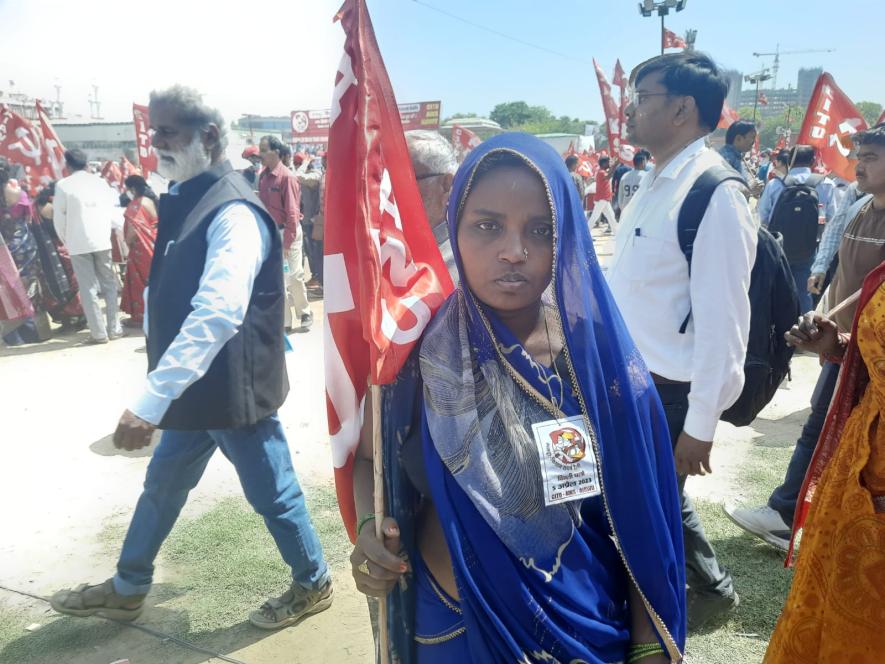
Asha is a widow mid-day meal worker, has 3 kids, and earns only 2000Rs. When she started working 15 years back, she was paid Rs1000, and despite the inflation all she's paid today is Rs 2000.
Since then, the amount paid to them has been increased only by Rs 1,000, making their monthly income Rs 2000. “Can you imagine leading your life in Rs 2,000? I don’t think anyone can survive in such a small amount. Even this does not come easy. Sometimes, we get paid in three months and sometimes in two. There are times when we receive Rs 4,000 and sometimes it's Rs 5,000,” narrated Asha. The women have been struggling to understand where things were going wrong and why they are not being paid on time. “We would be really grateful if they could keep us on a permanent basis. That way, at least we would receive a regular amount every month and there would be chances for a hike,” she said.
The women say that they are often threatened by the teachers and the village pradhan who asks them not to participate in protests or to put up a complaint. They allege that the threat is that their job would be taken if they were to talk about anything that happened in the school premises. On enquiring, NewsClick learned that the teachers allegedly made them do work that was not theirs to do. “They make us sweep the floors twice a day, prepare extra food for them, stay for longer hours just so that we could lock the doors after they are gone, and give them water, and tea whenever they wish. If we revolt, we are doomed,” narrated Nagma Bano, another mid-day meal worker from the same village.
Even though they work through the first half of May and the latter half of June, they are not paid for the work. “Work we do is for 12 months, and the months we are paid for is only 10. We are not able to take up other jobs since the school takes away the entire day.”
With hopes in their eyes and fear that they might lose their jobs on going back, the group proceeded towards the entry gate as their leader was calling them.
A Regular Member at Rallies
Ravi Das(37) had come all the way from West Bengal to attend the rally. He, since birth, has been physically impaired and cannot walk. While the people were entering in huge numbers during the morning, one person who missed most of the cameras was Ravi, who crawled his way through wearing a red t-shirt and carrying the symbolic red flag.
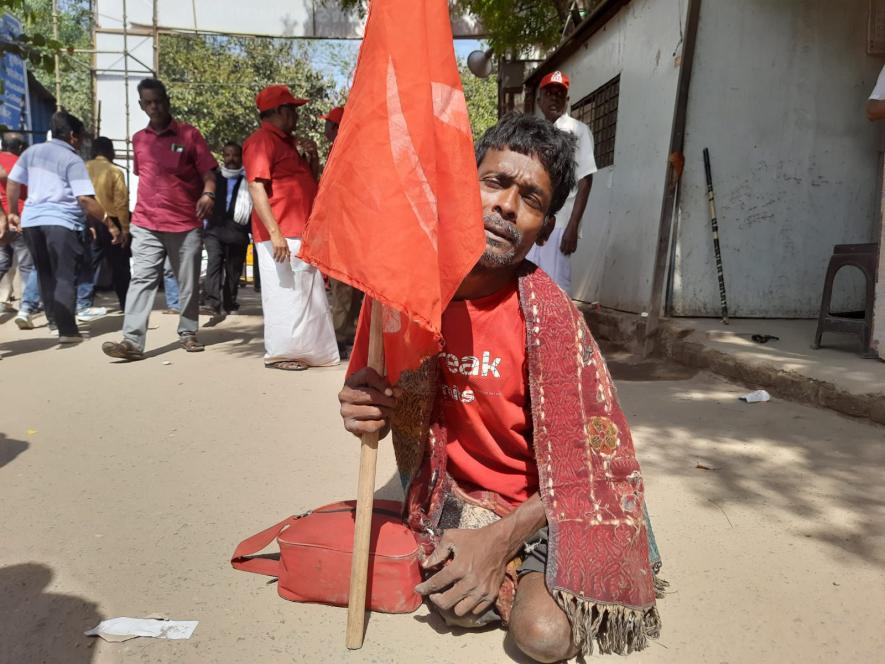
Ravi Das believes in the unity he sees today. He attends all the rallies and programs of the CPI(M) and stands strongly with the working class. He came all the way from West Bengal.
“I have been a huge supporter of CPI(M) from my school days, and I only studied until the fifth grade. I am a part of all the programmes that happen throughout the country, I booked my ticket on 24 March itself. Had never come to Delhi, glad I could be here,” he told NewsClick.
Ravi runs a small lottery ticket shop, and earns enough for himself. While talking, the reporter realised how well aware he was about the current happenings throughout the country. “I do not have a TV, but I sometimes go to the other shops and watch with them, there are a few kind people who read the news to me from the daily paper, that is how I know all of this. I have got a train to catch, but the unity that I see here, is making me wait a little more,” he said.
At the conclusion of the rally, the working-class people were imbued with a ray of new hope, belief, and a united struggle. The feeling of not being alone could be seen when farmers from Punjab and Haryana walked out together, when the workers from Bihar interacted with those of Maharashtra, and the Tamil Nadu farmers discussed the issues of MSP with the ones in the North.
Get the latest reports & analysis with people's perspective on Protests, movements & deep analytical videos, discussions of the current affairs in your Telegram app. Subscribe to NewsClick's Telegram channel & get Real-Time updates on stories, as they get published on our website.























